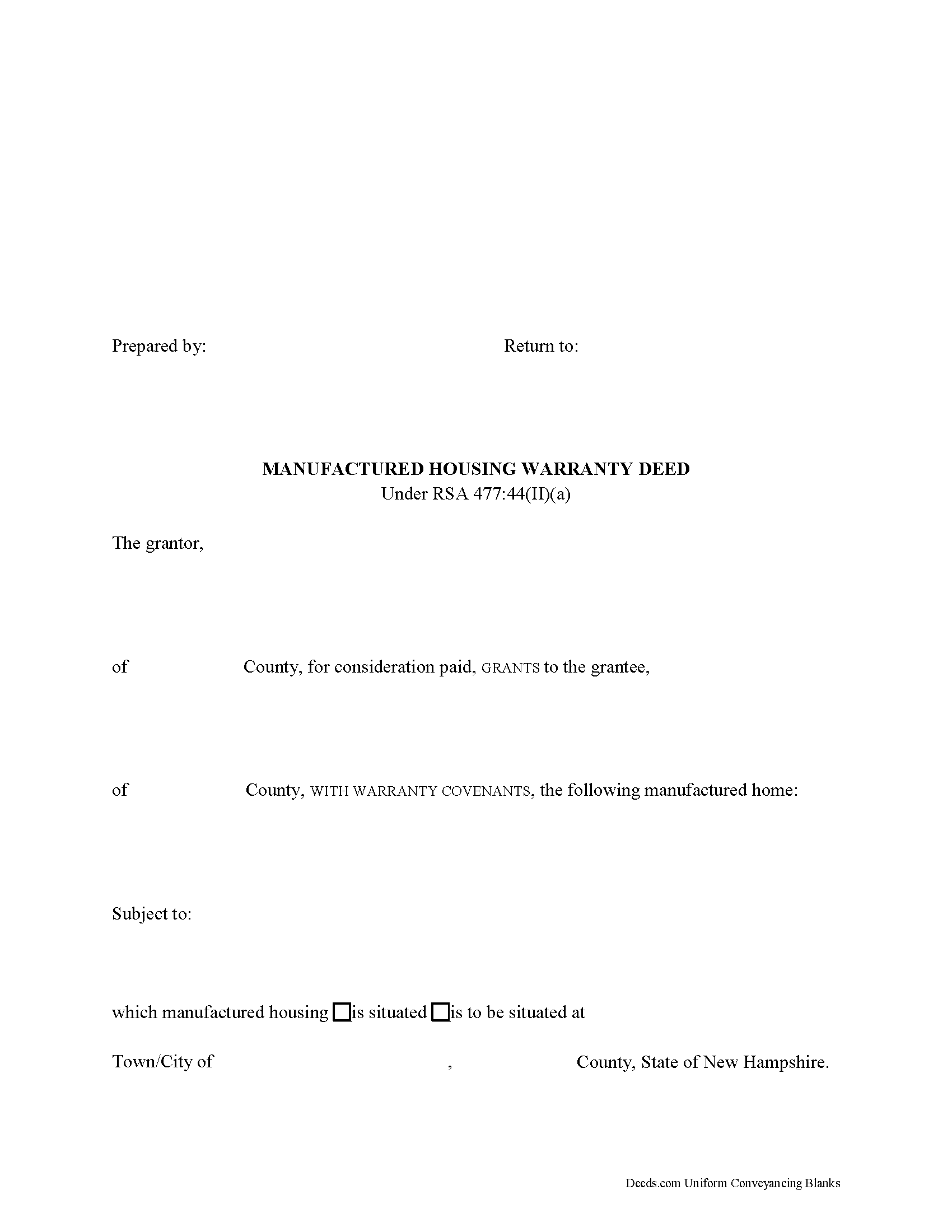Download New Hampshire Manufactured Housing Warranty Deed Legal Forms

New Hampshire Manufactured Housing Warranty Deed Overview

Manufactured housing is a structure that is "transportable in one or more sections" and designed to be a dwelling with no permanent foundation (RSA 674:31). This type of housing is considered real property and must be transferred by deed. In New Hampshire, manufactured housing can be transferred from one party to another by executing a manufactured housing warranty deed.
Manufactured housing warranty deeds are statutory in New Hampshire under RSA 477:44(II)(a). Any deed that follows this form transfers fee simple title with covenants. The grantor promises that, at the time of conveyance, he or she "was lawfully seized in fee simple of the manufactured housing" and has good right to sell and convey said premises; that the property is free from all encumbrances, except for restrictions stated within the deed; and that he or she will warrant and defend the property against any lawful claims and demands made by all persons (RSA 477:44(II)(a)).
Unlike a manufactured housing quitclaim deed under RSA 477:44(II)(b), a manufactured housing warranty deed guarantees the property against any and all claims. Instead, a manufactured housing quitclaim deed only guarantees the title against claims that arose during the time the grantor held title to the property.
A lawful deed includes the grantor's full name, mailing address, and marital status, and the grantee's full name, mailing address, marital status, and vesting. Vesting describes how the grantee holds title to the property. Generally, real property is owned in either sole ownership or in co-ownership.
For New Hampshire residential property, the primary methods for holding title in co-ownership are tenancy in common and joint tenancy. A grant of ownership of real estate to two or more persons is presumed to create a tenancy in common, unless a joint tenancy is expressly stated (RSA 477:18).
As with any conveyance of realty, a manufactured housing warranty deed requires a legal description of the property. The description must include the name of the manufacturer, the model number, and the serial number. Detail any restrictions associated with the property. Include information about where the manufactured housing is currently situated, or where it will be situated, as well as information about the tract/parcel owner, whether the housing has been relocated, and details about its prior location. Indicate whether the grantor is married and, if applicable, include the full name of the spouse in the field provided. This ensures that any spousal interest in the property is conveyed and does not encumber the property (RSA 480:5-a). Finally, the deed should meet all state and county standards of form and content for recorded documents.
Both the grantor and the owner of the tract/parcel upon which the manufactured housing currently sits or will sit must sign the deed in the presence of a notary public or other authorized official. For a valid transfer, record the deed at the recording office in the county where the property is currently located or will be located. Contact the same office with questions about recording, as well as to confirm accepted forms of payment.
Transfer taxes for manufactured housing are dependent upon where the manufactured housing is located or being relocated. Ask the local assessor's office questions about transfer taxes.
The grantee must file an original Form PA-34, Inventory of Property Transfer, with the Department of Revenue Administration within 30 days of recording of the deed, and also file a copy of the PA-34 with the local assessing official of the municipality where the property is located (RSA 74:18).
This article is provided for informational purposes only and is not a substitute for legal advice. Contact an attorney with questions about using manufactured housing warranty deeds, or for any other issues related to transfers of real property in New Hampshire.
(New Hampshire MHWD Package includes form, guidelines, and completed example)